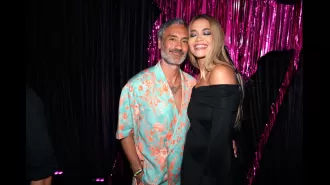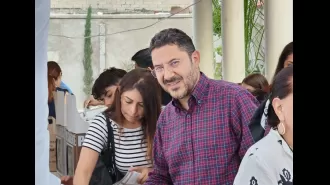A Metro reader discusses how social media is bringing together radicals.
MetroTalk discusses issues with social media algorithms, rail safety, and the potential drawbacks of simplifying rail fares.
August 15th 2024.

It's no secret that the internet has become a breeding ground for extremists, with social media platforms being a popular place for them to connect and share their views. But what may surprise you is that they don't even have to actively search for like-minded individuals on platforms like Facebook. As it turns out, the platform itself does the work for them.
Readers of MetroTalk have been discussing this issue and many others, including the recent controversial tweets from Elon Musk about the UK and his support for Donald Trump. While many have rightfully criticized Musk for his extreme views, it's important to remember that he is not alone in this. Social media, as a whole, has become a default setting for this kind of behavior.
Years ago, a paper was co-authored by a US-based NGO, Counter Extremism Project, which analyzed 1,000 Facebook accounts of Islamic State supporters and fighters. What was shocking to the authors was that as they were going through these extremist accounts, they started receiving friend suggestions for other extremist accounts. It became clear that Facebook was actually introducing potential terrorists to each other, making it easier for them to connect and potentially carry out their extremist actions.
This is just one of many issues with extremism and social media, as it can be found on any platform. It's important to remember that it's not just Musk or Twitter, but all social media platforms that contribute to this problem. Robert Postings, via email, reminds us to keep this in mind when discussing these issues.
And now, we turn to our readers to have their say on a different topic – the state of public transport and its safety for women. Recent figures have shown that over a third of women have experienced sexual harassment or offenses while commuting. With this in mind, many are calling for railway companies to reverse their policies of reducing visible staff on trains and not manning smaller stations.
After all, public transport is supposed to be a safer and greener option for travel. However, as costs increase and staffing levels decrease, it's becoming less and less appealing. Julian Self, from Wolverton, urges for a change in priorities to make rail travel a more secure and affordable option, especially for women.
But as one reader, Paul, points out, simplification of the fare structure may not necessarily lead to cheaper fares, as there is a risk of eliminating cheaper options. Nick, from Hartlepool, reminds us to be mindful of the wording used, as "best available fare" is not the same as "cheaper fare."
Moving on to another issue, Harry John, from Linton, expresses his frustration over the recent sodium cyanide spill in the Walsall canal in the West Midlands. He believes that the water company bosses are not doing enough to protect our waterways and calls for the return of water campaigner Feargal Sharkey.
And finally, Jean, from Huddersfield, shares her thoughts on the constant need for people to be listening or watching something on their mobile devices. She believes that people are afraid of silence and being alone with their thoughts, which can be beneficial for the mind. She encourages people to embrace daydreaming and mindfulness for their mental well-being.
So, what are your thoughts on these topics? Share your opinions in the comments below. Remember, you are more likely to be published if you provide your name and location with your comment. Let's keep the conversation going.
Readers of MetroTalk have been discussing this issue and many others, including the recent controversial tweets from Elon Musk about the UK and his support for Donald Trump. While many have rightfully criticized Musk for his extreme views, it's important to remember that he is not alone in this. Social media, as a whole, has become a default setting for this kind of behavior.
Years ago, a paper was co-authored by a US-based NGO, Counter Extremism Project, which analyzed 1,000 Facebook accounts of Islamic State supporters and fighters. What was shocking to the authors was that as they were going through these extremist accounts, they started receiving friend suggestions for other extremist accounts. It became clear that Facebook was actually introducing potential terrorists to each other, making it easier for them to connect and potentially carry out their extremist actions.
This is just one of many issues with extremism and social media, as it can be found on any platform. It's important to remember that it's not just Musk or Twitter, but all social media platforms that contribute to this problem. Robert Postings, via email, reminds us to keep this in mind when discussing these issues.
And now, we turn to our readers to have their say on a different topic – the state of public transport and its safety for women. Recent figures have shown that over a third of women have experienced sexual harassment or offenses while commuting. With this in mind, many are calling for railway companies to reverse their policies of reducing visible staff on trains and not manning smaller stations.
After all, public transport is supposed to be a safer and greener option for travel. However, as costs increase and staffing levels decrease, it's becoming less and less appealing. Julian Self, from Wolverton, urges for a change in priorities to make rail travel a more secure and affordable option, especially for women.
But as one reader, Paul, points out, simplification of the fare structure may not necessarily lead to cheaper fares, as there is a risk of eliminating cheaper options. Nick, from Hartlepool, reminds us to be mindful of the wording used, as "best available fare" is not the same as "cheaper fare."
Moving on to another issue, Harry John, from Linton, expresses his frustration over the recent sodium cyanide spill in the Walsall canal in the West Midlands. He believes that the water company bosses are not doing enough to protect our waterways and calls for the return of water campaigner Feargal Sharkey.
And finally, Jean, from Huddersfield, shares her thoughts on the constant need for people to be listening or watching something on their mobile devices. She believes that people are afraid of silence and being alone with their thoughts, which can be beneficial for the mind. She encourages people to embrace daydreaming and mindfulness for their mental well-being.
So, what are your thoughts on these topics? Share your opinions in the comments below. Remember, you are more likely to be published if you provide your name and location with your comment. Let's keep the conversation going.
[This article has been trending online recently and has been generated with AI. Your feed is customized.]
[Generative AI is experimental.]
0
0
Submit Comment





